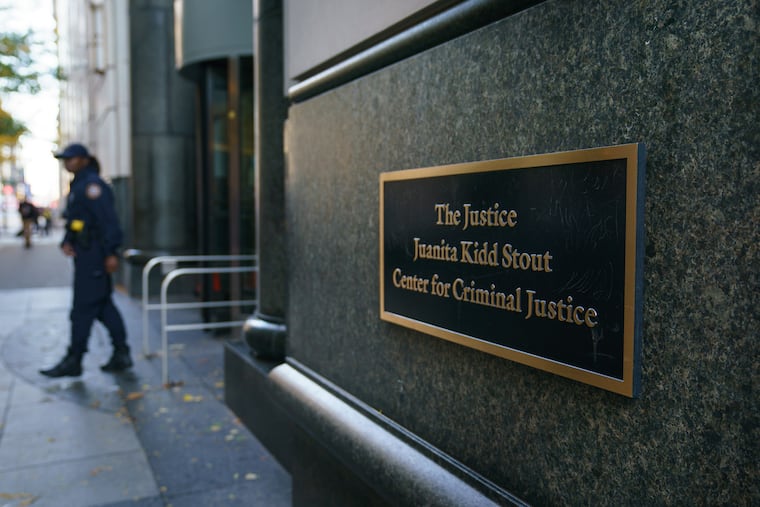Krasner is fighting to end online broadcasts of trials, a COVID workaround. Defenders and advocates are supporting his effort.
District Attorney Larry Krasner has filed a petition with the state Supreme Court to end the practice of broadcasting trials over YouTube. He says doing so causes undue risk to witnesses.

At the start of Khyzee Brown’s trial on murder charges last week, Assistant District Attorney Robert Foster described to jurors, from behind his mask, how the 24-year-old had shot a neighborhood rival multiple times, while Brown’s defense attorney insisted that police had the wrong man. On Monday, the jurors acquitted Brown in the death of Markeise Chandler in February 2019 in Olney.
In between, the two lawyers, Brown, and the jurors never shared a room: The entire homicide trial, Philadelphia’s first since the coronavirus restrictions were lifted, took place virtually, with the proceedings broadcast over YouTube.
The unprecedented technological workaround to satisfy social-distancing concerns is the subject of a challenge that District Attorney Larry Krasner has brought to the state Supreme Court. In a petition directly to the high court, a rarely taken step called a King’s Bench motion, Philadelphia’s top prosecutor on Monday asked the court to prevent future trials from being streamed online in real time, saying the practice opens the door for witnesses and defendants alike to be intimidated by viewers illegally recording and distributing their testimonies.
“The [First Judicial District] has gone too far in attempting to meet public access requirements in the COVID-19 era,” Krasner and his staff wrote in the petition. “The policy of streaming criminal jury trials over YouTube violates the privacy of all parties and endangers witnesses in a jurisdiction known for intimidation and retaliation achieved through social media. There is no need to take these risks where ample alternatives exist that meet or exceed constitutional requirements.”
» READ MORE: As jury trials resume in Philadelphia, courts lay out plans for juror safety
Knowing that they’re being recorded might scare away already-reluctant witnesses, Krasner asserts. And having the proceedings available essentially worldwide makes sequestering witnesses almost impossible. There are also concerns about re-traumatizing victims and their families, especially if excerpts of testimonies later surface online through social media.
In a rare instance of collaboration, public defenders, legal advocates, and some private attorneys agree, saying they worry that the practice could cause more harm than good.
A spokesperson for the Administrative Office of Pennsylvania Courts, the entity representing the Philadelphia court system in Krasner’s legal challenge, declined to comment Tuesday, citing a policy against speaking about pending litigation.
The petition lays out several alternatives to YouTube broadcasts, including closed-circuit television feeds for jurors seated elsewhere in the Criminal Justice Center or private Zoom calls, which other jurisdictions have been using during the pandemic for smaller preliminary hearings and other matters.
Outside the city, some suburban counties have resumed trials as well, notably Bucks and Chester, without having to resort to online broadcasting. Instead, those courts have spread out proceedings into larger courtrooms, restricting the number of people allowed inside.
Local defense attorneys who practice in both the city and the suburbs are split over the issue.
Paul Lang, a regular at both Philadelphia’s criminal justice center and suburban courthouses, said the increased access to court proceedings could thwart an attorney’s ability to defend his or her client.
“I can’t imagine any litigant — prosecutors or defense lawyers — in a homicide trial would want streaming video: Autopsy photos frequently show bodies in undress, further embarrassing victims; Witnesses don’t want any publicity,” he said. “And defense lawyers don’t want the public guessing their defenses, ideas, or strategies. It does nothing to advance the interest of a fair trial.”
But A. Charles Peruto Jr., another veteran defense attorney in the Philadelphia region, sees it differently.
“I don’t think there is any reasonable basis to exclude cameras from a courtroom unless you’re hiding something,” he said. “You talk about intimidation: Those people in a non-COVID era were permitted to go to court and watch a witness, and that’s even more intimidating. You cannot violate the Constitution and prevent the people from watching a trial."
Krasner’s petition also points out that it is illegal in Pennsylvania to record criminal proceedings, and that courthouse staff usually prohibit cellphones from being used in courtrooms. The new online policy, in effect “performs that very function" for anyone who wants to record and distribute testimony “with malicious intent,” the petition said.
That’s also a concern for Keir Bradford-Grey, chief defender and head of the Philadelphia Defenders' Association. In a statement Tuesday, Bradford-Grey said she and her organization fully support Krasner’s efforts.
“Using YouTube to stream homicide trials will benefit neither the victims' families nor the accused,” she said. "We do understand the need for transparency, but we need to find a better way to provide the public with access to court processes during the pandemic.”
There’s also a risk that excerpts of recordings might be wielded against a defendant later, especially if he or she is acquitted of criminal charges.
Deborah Gross, the president of Pennsylvanians for Modern Courts, a nonprofit that advocates for improving access to and understanding of the judicial system, said that permanency may be an unintended consequence of the YouTube policy.
“What happens to innocent until proven guilty?” Gross said Tuesday. “We can expunge records, but I don’t know how you’re going to be able to prevent any kind of recording from haunting somebody. You would potentially have access to a snapshot of a testimony, and that could be used to prevent someone from getting a job, or getting housing.”
— Staff writer Chris Palmer contributed to this article.